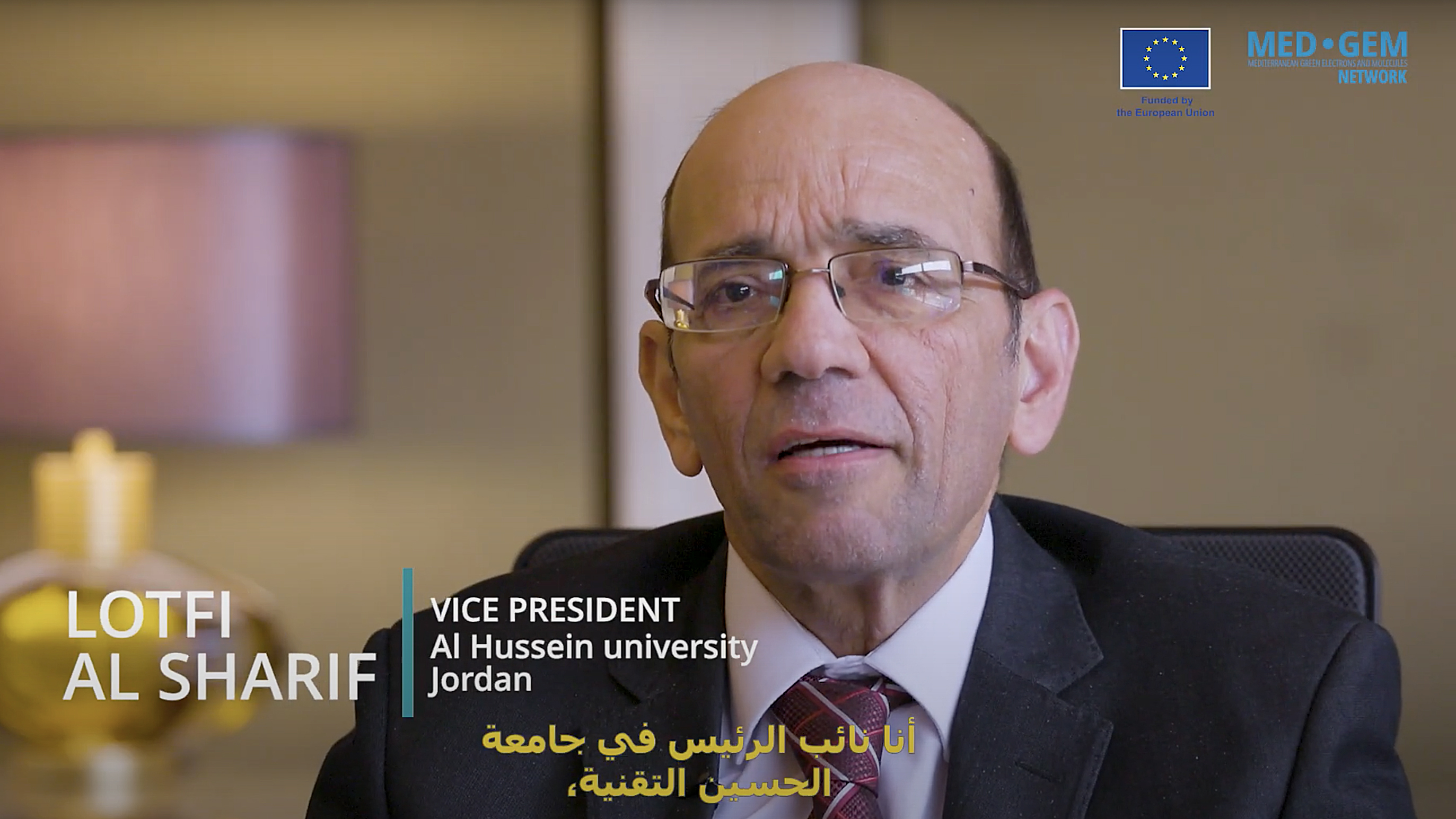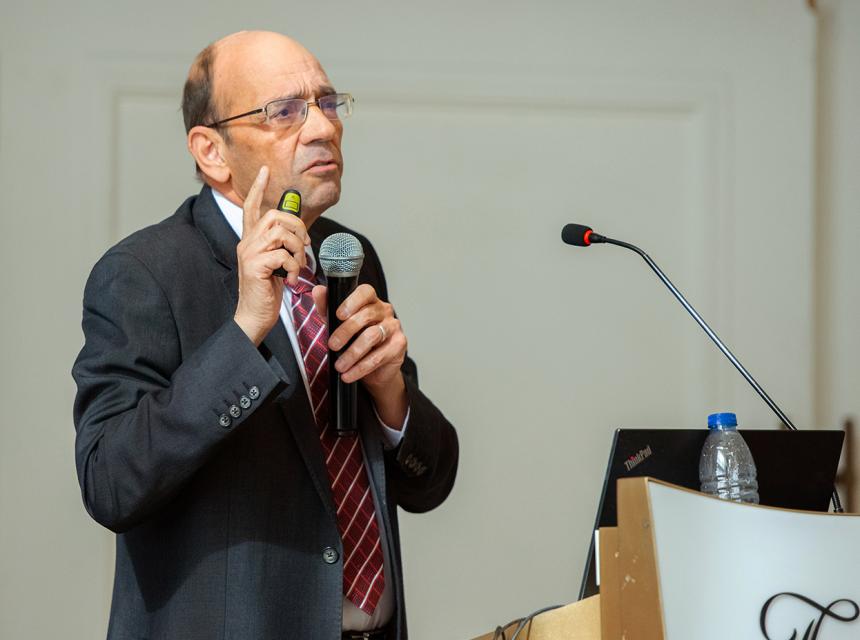Up-skilling and Employability. Exploring Opportunities in Jordan's Industrial Sector Transition to Green Hydrogen with Lotfi Al Sharif
Lotfi Al Sharif, the Vice President at Al-Hussein Technical University, joins MED-GEM for an insightful interview discussing the impact of hydrogen on employment in Jordan. Al-Hussein Technical University, a non-comprehensive technical institution, prioritizes employability as its main objective and actively participates in the MED-GEM Network. In this interview, Lotfi shares with us key findings from a collaborative study with GIZ, focusing on the evaluation of hydrogen's potential impact on various industrial sectors and employment in Jordan.

🎥 Watch the interview on Youtube
Could you present to us the study conducted in cooperation with GIZ on the impact of hydrogen on employment in Jordan and explain how you evaluated the potential of this energy transition for the various industrial sectors?
At MED-GEM workshop on Hydrogen and Power to X, and we've had lots of interesting discussions. I specifically concentrated on the skills, skills assessment, and assessing the effect of a hydrogen transition economy on employment in Jordan. What jobs would it need, what the numbers, and this has been actually based on a lengthy study which we've been doing in cooperation with the GIZ as a university.
Looking at the local sectors and how they use hydrogen, what is the potential of them using hydrogen? What are the quantities of hydrogen that could be potentially produced either for local consumption or for export to markets like Europe, for example? And otherwise.
We've identified the number of jobs based on ten sectors. So we've looked at sectors like fertilizers. For example, there's a strong fertilizer industry in Jordan which could benefit from green ammonia produced from green hydrogen. And we also looked at sectors like refineries, Jordan Petroleum refinery and how it can actually convert from grey hydrogen to green hydrogen and what benefits that would produce.
We also looked at areas like transport, green transport, using hydrogen, using trucks and public transport buses. And we also looked at other areas like, for example, areas that use large amounts of heat like steel production and cement. And we call these hard to abate sectors. They are sectors which are very difficult to decarbonize with the use of electricity.
How do you envision the creation and development of jobs as part of the transition to a hydrogen economy in Jordan, and what kind of training is planned to enable workers, including the unemployed, to adapt to these new opportunities?
I presented the study and there was lots of interesting discussions around it, around the numbers, and so on. And also one of the issues was these jobs. Where would they come from, and do we start from scratch? Do we train someone right from the beginning for five years as a hydrogen engineer or a hydrogen technician? The point of view that I put across is that we can up-skill existing graduates and existing graduates who are unfortunately unemployed could benefit from up-skilling themselves, adding new skills related to hydrogen in a very short period of time, in a six-month period of time, concentrating on specific skills that are needed for the hydrogen economy.
This has two advantages. The first advantage is that it allows us to be very dynamic and responsive to the market, bringing in skills very quickly onto the market. And the other advantage is that it starts addressing the unemployment problems that we suffer from in Jordan, as in many other countries in the region.
Regarding the new jobs that are needed, this is an interesting area. There are some jobs that we need to concentrate on very specifically because of the safety-critical aspects. So there is actually definitely a job of health, safety, health and safety officer. The health and safety officer would be someone maybe with a background in engineering or something similar. He or she would actually receive proper training and certification in the area of health and safety because hydrogen obviously is a flammable liquid. Even ammonia as well, which is a hydrogen derivative, also has health risks and needs to be handled properly.
Another area which is interesting is specific technicians that work in safety-critical areas like electricians working in the hydrogen facility or welders or gas services. These three technicians would need specific training because of the safety criticality of that field.
Other jobs would be basically up-skilling an existing engineer like a mechanical, electrical, or chemical engineer and ups-killing him or her into the hydrogen field. So, equipping him or her with the required skills and capabilities, building on the previous knowledge, the five-year or the four-year degree that they have already studied.
Accepting the fact that they already have lots of skills which are useful to the hydrogen economy, but equipping them with the skills and the knowledge and all of these jobs will have a 50% content of theory and a 50% content of practical hands-on training on actual industrial-grade facilities. So, the training will actually concentrate on that, looking at the skills, observing them doing the skills, and gaining them and doing them properly in a controlled environment.
What kind of support do you need in order to achieve these objectives?
Regarding what is required in terms of help and support, whether from the government, whether from the European Union and MED-GEM and so on, I think there is actually a need for intermediate support in terms of training, up-skilling, study tours. These have been very useful support from the European Union. Study tours are very useful for decision-makers and technical staff in Jordan, understanding what the state of the art is in Europe, how a lot of these things are done, and transferring that knowledge and technology transfer to Jordan.
There is definitely an incentive and regulatory need or a need for an incentive and regulatory framework to encourage this energy transformation. It is not going to be easy transforming from a conventional gray hydrogen economy to a green hydrogen economy. It does need a kick start at the beginning. So there is a need from the government to prepare a regulatory framework that encourages people to do that. There is also a financial incentive framework that is needed to encourage companies in the private sector. The private sector will find it difficult to move if there are not enough incentives.
So, there is a role for the government, from the European Union and from MED-GEM. I think it would be useful to have things like study tours and so on. But I think long term, there is also a need to see how the market can be incentivized and stimulated so that the green hydrogen will be produced in Jordan and its derivatives and then will be exported and used in European markets. There is that need to kick-start, I think once it gets started and it becomes feasible, then it can actually flow on its own. But I think the first five or ten years would be critical in having that financial support and the customer support to get that system up and running.
What is your message to the MED-GEM Networkers?
I think I would like to send the message of hope. I am very hopeful that we are moving in the right direction. Jordan has lots of challenges, but we've had good support and good governance from the government in terms of guiding the market, particularly in terms of renewable energy.
The success they have achieved in renewable energy guides us toward a green hydrogen economy, which is a continuation and a necessary step. We are very grateful as well to MED-GEM, the EU, and the GIZ for all the opportunities they have offered us in Jordan and in terms of cooperation, opening up avenues, and so on. That's been very well received, and I think it's starting to have a good effect on education, the economy, and the local market.

